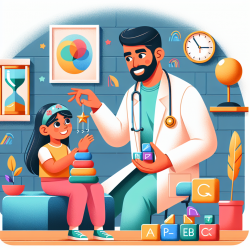Introduction
In the realm of speech-language pathology, understanding the nuanced needs of individuals with specific health conditions is crucial. The research article "Sex effects across the lifespan in women with multiple sclerosis" provides valuable insights into how multiple sclerosis (MS) affects women differently across their lifespan. This blog post aims to translate these findings into actionable strategies for speech therapists working with female MS patients, particularly in online therapy settings like those provided by TinyEYE.
Understanding the Research
The research highlights several key aspects of MS in women, including the influence of sex hormones, the impact of pregnancy, and the role of reproductive aging. These factors contribute to the variability in disease progression and symptom manifestation, which can directly affect communication abilities. For instance, hormonal changes during pregnancy and menopause can influence cognitive functions, which are integral to speech and language processing.
Implementing Research Insights in Therapy
Speech therapists can enhance their practice by integrating the following strategies based on the research findings:
- Customized Therapy Plans: Tailor therapy sessions to accommodate hormonal fluctuations. For example, during pregnancy, focus on exercises that support cognitive functions and memory, which may be affected by hormonal changes.
- Holistic Assessment: Incorporate assessments that consider the patient’s reproductive stage and hormonal status. This can help in identifying specific challenges related to speech and language that may arise during different life stages.
- Interdisciplinary Collaboration: Work closely with neurologists and other healthcare providers to understand the broader health context of the patient. This collaboration can lead to more comprehensive care plans that address both neurological and speech-related challenges.
- Family Involvement: Engage family members in therapy sessions to provide support and reinforcement of communication strategies at home. This is particularly beneficial during postpartum periods when relapse risk may increase.
Encouraging Further Research
While the research provides a solid foundation, there is a need for further studies to explore the direct impact of MS on speech and language functions in women. Practitioners are encouraged to participate in or initiate research projects that focus on this intersection. By contributing to the body of knowledge, speech therapists can help refine therapeutic approaches and improve outcomes for female MS patients.
Conclusion
Integrating research insights into practice is essential for providing effective speech therapy to women with MS. By understanding the unique challenges posed by hormonal changes and reproductive aging, therapists can develop targeted interventions that address the specific needs of this population. For those interested in delving deeper into the research, the original paper can be accessed here.










